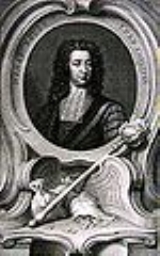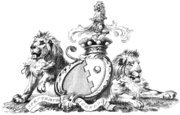
Henry Boyle, 1st Baron Carleton
Encyclopedia
Henry Boyle, 1st Baron Carleton, PC (12 July 1669 – 31 March 1725), was an Anglo-Irish
politician of the early eighteenth century.
, Boyle was educated at Westminster School
and Trinity College, Cambridge
. and entered the army under the auspices of his uncle, the Tory
politician Lord Rochester
. However, Boyle himself became a Whig
, and in 1688 deserted the army of James II
in favour of the Prince of Orange
.
 In 1689, he was elected to the Parliament of England
In 1689, he was elected to the Parliament of England
for Tamworth
, but was defeated the next year. He spent the next two years in Ireland
managing the family estates and represented Cork County
in the Irish House of Commons
in 1692. In the same year, he returned also to parliament for Cambridge University
, and became a prominent spokesman of the "country" opposition, but in 1697 he switched to the court party. Here he advanced quickly, becoming a Lord of the Treasury
in 1699 and Chancellor of the Exchequer of England in 1701.
He picked up other offices as he went along, becoming Lord Lieutenant of the West Riding of Yorkshire
and Lord Treasurer of Ireland in 1704, and was elected member for Westminster
in 1705. With the departure of Harley
and his followers from the government, Boyle became Secretary of State for the Northern Department
and Lord Treasurer Godolphin's
principal lieutenant in the Commons. His and Godolphin's dominance in the ministry was increasingly overshadowed by the power of the Junto
of Whig aristocrats, however, and in 1710 he retired from office and withdrew from politics with the arrival of Harley's new Tory
ministry.
as Baron Carleton, and became Lord President
in 1721, an office in which he continued until his death in 1725.
Carlton Way, a road in north Cambridge
that follows the path of the Roman Akeman Street
, and the public house The Carlton Arms on the same road, are named after him.
Anglo-Irish
Anglo-Irish was a term used primarily in the 19th and early 20th centuries to identify a privileged social class in Ireland, whose members were the descendants and successors of the Protestant Ascendancy, mostly belonging to the Church of Ireland, which was the established church of Ireland until...
politician of the early eighteenth century.
Biography
The son of Charles Boyle, 3rd Viscount DungarvanCharles Boyle, 3rd Viscount Dungarvan
Charles Boyle, 3rd Viscount Dungarvan, 3rd Baron Clifford, FRS , was a British peer and politician...
, Boyle was educated at Westminster School
Westminster School
The Royal College of St. Peter in Westminster, almost always known as Westminster School, is one of Britain's leading independent schools, with the highest Oxford and Cambridge acceptance rate of any secondary school or college in Britain...
and Trinity College, Cambridge
Trinity College, Cambridge
Trinity College is a constituent college of the University of Cambridge. Trinity has more members than any other college in Cambridge or Oxford, with around 700 undergraduates, 430 graduates, and over 170 Fellows...
. and entered the army under the auspices of his uncle, the Tory
Tory
Toryism is a traditionalist and conservative political philosophy which grew out of the Cavalier faction in the Wars of the Three Kingdoms. It is a prominent ideology in the politics of the United Kingdom, but also features in parts of The Commonwealth, particularly in Canada...
politician Lord Rochester
Laurence Hyde, 1st Earl of Rochester
Laurence Hyde, 1st Earl of Rochester KG PC was an English statesman and writer. He was originally a supporter of James II but later supported the Glorious Revolution in 1688.-Early life:...
. However, Boyle himself became a Whig
British Whig Party
The Whigs were a party in the Parliament of England, Parliament of Great Britain, and Parliament of the United Kingdom, who contested power with the rival Tories from the 1680s to the 1850s. The Whigs' origin lay in constitutional monarchism and opposition to absolute rule...
, and in 1688 deserted the army of James II
James II of England
James II & VII was King of England and King of Ireland as James II and King of Scotland as James VII, from 6 February 1685. He was the last Catholic monarch to reign over the Kingdoms of England, Scotland, and Ireland...
in favour of the Prince of Orange
William III of England
William III & II was a sovereign Prince of Orange of the House of Orange-Nassau by birth. From 1672 he governed as Stadtholder William III of Orange over Holland, Zeeland, Utrecht, Guelders, and Overijssel of the Dutch Republic. From 1689 he reigned as William III over England and Ireland...
.

Parliament of England
The Parliament of England was the legislature of the Kingdom of England. In 1066, William of Normandy introduced a feudal system, by which he sought the advice of a council of tenants-in-chief and ecclesiastics before making laws...
for Tamworth
Tamworth (UK Parliament constituency)
Tamworth is a parliamentary constituency represented in the House of Commons of the Parliament of the United Kingdom. It elects one Member of Parliament by the first past the post system of election.- History :...
, but was defeated the next year. He spent the next two years in Ireland
Ireland
Ireland is an island to the northwest of continental Europe. It is the third-largest island in Europe and the twentieth-largest island on Earth...
managing the family estates and represented Cork County
Cork County (Parliament of Ireland constituency)
Cork County was a constituency represented in the Irish House of Commons to 1800.-Boundaries and Boundary Changes:This constituency was the borough in County Cork. It returned two members to the Parliament of Ireland to 1800.-History:...
in the Irish House of Commons
Irish House of Commons
The Irish House of Commons was the lower house of the Parliament of Ireland, that existed from 1297 until 1800. The upper house was the House of Lords...
in 1692. In the same year, he returned also to parliament for Cambridge University
Cambridge University (UK Parliament constituency)
Cambridge University was a university constituency electing two members to the British House of Commons, from 1603 to 1950.-Boundaries, Electorate and Election Systems:...
, and became a prominent spokesman of the "country" opposition, but in 1697 he switched to the court party. Here he advanced quickly, becoming a Lord of the Treasury
Lord of the Treasury
In the United Kingdom, there are at least six Lords of the Treasury who serve concurrently. Traditionally, this board consists of the First Lord of the Treasury, the Second Lord of the Treasury, and four or more junior lords .Strictly they are commissioners for exercising the office of Lord...
in 1699 and Chancellor of the Exchequer of England in 1701.
He picked up other offices as he went along, becoming Lord Lieutenant of the West Riding of Yorkshire
Lord Lieutenant of the West Riding of Yorkshire
This is a list of those who have held the position of Lord Lieutenant of the West Riding of Yorkshire from its creation in 1660 to its abolition on 31 March 1974. From 1699 until 1974, all Lords Lieutenant were also Custos Rotulorum of the West Riding of Yorkshire...
and Lord Treasurer of Ireland in 1704, and was elected member for Westminster
Parliament of Great Britain
The Parliament of Great Britain was formed in 1707 following the ratification of the Acts of Union by both the Parliament of England and Parliament of Scotland...
in 1705. With the departure of Harley
Robert Harley, 1st Earl of Oxford and Mortimer
Robert Harley, 1st Earl of Oxford and Earl Mortimer KG was a British politician and statesman of the late Stuart and early Georgian periods. He began his career as a Whig, before defecting to a new Tory Ministry. Between 1711 and 1714 he served as First Lord of the Treasury, effectively Queen...
and his followers from the government, Boyle became Secretary of State for the Northern Department
Secretary of State for the Northern Department
The Secretary of State for the Northern Department was a position in the Cabinet of the government of Great Britain up to 1782. Before the Act of Union, 1707, the Secretary of State's responsibilities were in relation to the English government, not the British. Even after the Union, there was...
and Lord Treasurer Godolphin's
Sidney Godolphin, 1st Earl of Godolphin
Sir Sidney Godolphin, 1st Earl of Godolphin, KG, PC was a leading English politician of the late 17th and early 18th centuries...
principal lieutenant in the Commons. His and Godolphin's dominance in the ministry was increasingly overshadowed by the power of the Junto
Whig Junto
The Whig Junto is the name given to a group of leading Whigs who were seen to direct the management of the Whig party and often the government, during the reigns of William III and Anne. The Whig Junto proper consisted of John Somers, later Baron Somers; Charles Montagu, later Earl of Halifax;...
of Whig aristocrats, however, and in 1710 he retired from office and withdrew from politics with the arrival of Harley's new Tory
Tory
Toryism is a traditionalist and conservative political philosophy which grew out of the Cavalier faction in the Wars of the Three Kingdoms. It is a prominent ideology in the politics of the United Kingdom, but also features in parts of The Commonwealth, particularly in Canada...
ministry.
Baron Carleton
With the Hanoverian succession in 1714, Boyle was raised to the peeragePeerage
The Peerage is a legal system of largely hereditary titles in the United Kingdom, which constitute the ranks of British nobility and is part of the British honours system...
as Baron Carleton, and became Lord President
Lord President of the Council
The Lord President of the Council is the fourth of the Great Officers of State of the United Kingdom, ranking beneath the Lord High Treasurer and above the Lord Privy Seal. The Lord President usually attends each meeting of the Privy Council, presenting business for the monarch's approval...
in 1721, an office in which he continued until his death in 1725.
Carlton Way, a road in north Cambridge
Cambridge
The city of Cambridge is a university town and the administrative centre of the county of Cambridgeshire, England. It lies in East Anglia about north of London. Cambridge is at the heart of the high-technology centre known as Silicon Fen – a play on Silicon Valley and the fens surrounding the...
that follows the path of the Roman Akeman Street
Akeman Street
Akeman Street was a major Roman road in England that linked Watling Street with the Fosse Way. Its junction with Watling Steet was just north of Verulamium and that with the Fosse Way was at Corinium Dobunnorum...
, and the public house The Carlton Arms on the same road, are named after him.

